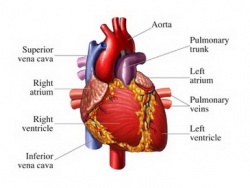Heart
The heart (hadaya) is a specialized four-chambered muscle which pumps blood through the body. It is one of the 31 parts of the body, according to the early Buddhist analysis. In non-philosophical discourse throughout the Tipiṭaka the word ‘heart’ is used where we would expect to see the word ‘mind’ and the heart itself is often associated with various emotions. We read of someone’s ‘heart breaking with sorrow’(Ja.V,180), of having a ‘calm heart’ (A.V,64), a ‘distraught heart (Ja.IV,415) and of ‘knowing another person’s heart’ (M.I,32). The Buddha said that his words ‘go right to the heart’ (hadayaṃgamā). Early abhidhamma thinkers considered the question of what could be the physical seat of consciousness, although they never decided on any particular organ. Later abhidhamma speculation decided that it was the heart (hadayavatthu). Today we know that the brainmatthaluṅga) is the physical basis of consciousness, although it is true that we seem to feel certain strong emotions in the solar plexus just near the heart.
